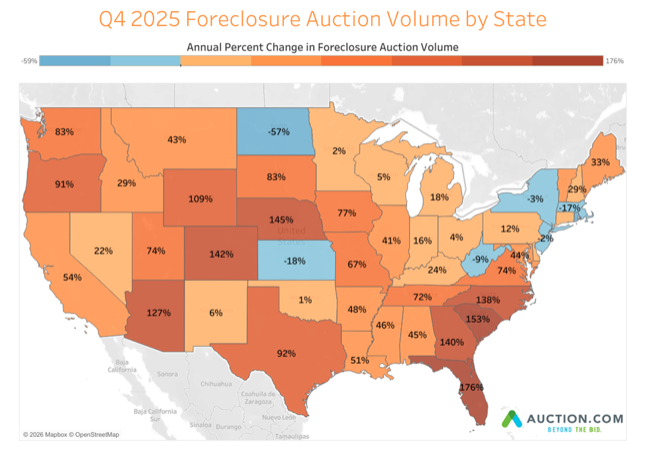Here are five reasons a significant market correction may be on the horizon.
During the past two years, the real estate industry has been waiting for a market correction that has yet to occur. Even though concern among lenders has decreased, numerous factors point to a significant correction.
The state of the industry as a whole is not sustainable. We have seen prices increase drastically and frequent bidding wars in areas previously avoided by prospective buyers and investors.
There is no question the pandemic has had a massive effect on the real estate industry. In March 2020, many owners and renters had to shift to remote work, which changed the way they viewed their homes.
Americans started to question their quality of life and were no longer content living in an 800-square-foot studio apartment. This resulted in many people moving out of metro areas to less dense and affordable locations. Historically low interest rates helped many Americans become first-time homebuyers. For many sellers, everything seemed on the up and up. Alas, nothing lasts forever.
So, why should there be cause for concern? Here are five reasons to consider.
1. Interest Rates
An increase in interest rates is one of the most important indicators of market upheaval. As previously noted, low interest rates helped many people purchase homes for the first time. This not only assisted buyers but also helped stimulate the entire economy. Those low mortgage payments are about to become a thing of the past, however, and will leave many Americans’ purse strings tighter than ever.
2. Forbearance
Mortgage servicing companies are not offering modifications on mortgages currently in a COVID-19 related forbearance, which is significant. In the past, when borrowers exited forbearance, they were given heavy subsidies from the U.S. government. What will occur when those subsidies are diminished? Many owners will default and go into foreclosure.
Keep in mind that forbearances extended to other types of debt too. Although mortgage holders have typically done an excellent job with proper credit reporting, the same cannot be said for other creditors, such as credit card companies. This improper reporting to the credit agencies has decimated the credit scores of many Americans who merely have been trying to stay afloat during the pandemic.
3. Inflation
During the past few years, a great deal of money was pumped into the economy, causing massive inflation. In fact, we are dealing with the largest increase in inflation in more than 40 years. Inflation is one of the scariest indicators of market correction, and it is directly correlated to rising interest rates.
At the end of the day, borrowers need to put food on the table. If they cannot afford the staples they need to survive, how will they be able to make their mortgage payments? It follows that inflation, coupled with low inventory, may lead to people simply not paying any longer.
A person in foreclosure might not want to sell their home for two reasons, even if it increases in value. On one hand, if the asset is appreciating significantly, he or she can hire an attorney to prolong the process, which could result in that asset paying for itself several times over. On the other hand, these owners simply might not have anywhere else to go. With rising rents and low housing inventory, the chances they may opt to remain in their homes is high.
4. Lack of Inventory
Right now, sellers are living the dream. On any given day, there may be numerous buyers bidding for properties that were worth half as much at the beginning of the pandemic. For example, during a bidding war, a home that is on the market for $500,000 may end up going for $100,000 over the asking price. Buyers assume equity is guaranteed and are investing in properties they would have never considered in the past. This is not sustainable. Moreover, when the current available inventory is taken off the market, there is not going to be a quick influx of new properties for sale. The drastic increase in construction costs, along with the current sky-high prices for land, is severely diminishing the number of new homes being built.
A decreased demand for housing coupled with rising interest rates could very well lead to a significant market correction. However, this can be prevented if there is a manageable increase in interest rates, a robust job market, rising wages, and targeted assistance from servicers and investors on behalf of borrowers.
5. Cost of Consumer and Commercial Goods
There is no question the pandemic has had a direct impact on the industry. COVID-19 caused many people to be unavailable for work, creating a supply/distribution chain disruption. Yes, it was more significant in 2020 and 2021, but we are still feeling the repercussions today. Manufacturers are still not able to supply necessary products due to a worker shortage. That supply shortage combined with transportation issues has had a tremendous impact on the cost of goods and industry-related materials.
6. The Future Is in Your Hands
There are a variety of ways the private lending industry can avoid a disruption. It is essential that lenders pay attention to the number of foreclosures in their communities. They are a big indicator of how quickly the market is changing and how it is affecting the judicial system. Even if a borrower forecloses on a property, they still need to go through a process that could very likely take many years. In many places, this timeframe is only increasing. Investors do not want to wait three years to recoup their investments. By keeping an eye out and speaking to other lenders, that bottleneck can be avoided.
Lenders need to communicate often with their borrowers and stress the importance of staying current on their payments. Many lenders rely heavily on repeat borrowers and may assume those borrowers will reliably make payments. Unfortunately, things happen in borrowers’ lives that may impair their ability to pay. Relationships are key in the private lending industry. It is imperative that lenders know what is occurring in their borrowers’ lives in order to mitigate risk and keep the relationship intact.
Lenders need to start analyzing their business models and prepare to adjust the type of borrowers they typically would target. All the factors discussed previously could affect a potential borrower’s credit. Borrowers who have a 730 credit score today might drop to a 650 tomorrow. If lenders prepare for an increase in inflation, interest rates, and supply-chain disruption, the industry will remain stable and prosper.
The private lending industry must be cognizant of additional issues a failure to keep the dreaded market correction at bay will create. Although many borrowers are currently sitting on figurative treasure troves of equity, this theoretical wealth can disappear overnight. If housing values significantly drop, a reciprocal increase in foreclosures will follow. Obviously, an uptick in foreclosures and zombie homes will only further exacerbate these problems.
By being vigilant and prudent now, lenders can prevent another housing crash. Almost as importantly, lenders can prevent their own financial losses simply by maintaining good relationships with their borrowers.











Leave A Comment